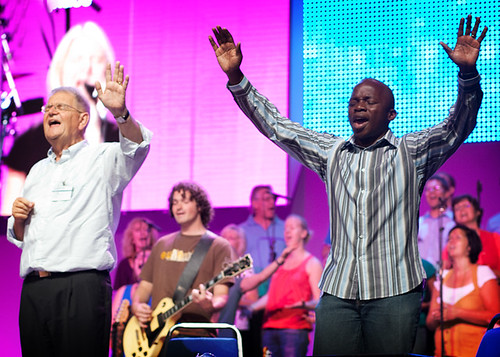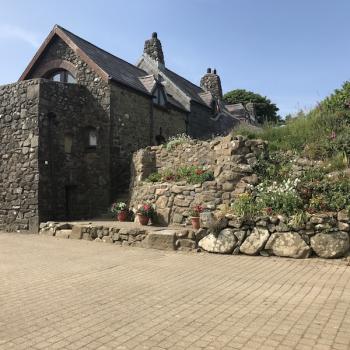Wow! What a glorious time of worship we have just shared together here at Together On A Mission. Rocky, powerful rhythms belted out and set to potent lyrics rich in doctrine. Bass and drums were clearly designed to glorify God.
There was a tongue which was interpreted with a prayer uplifting the trustworthiness of God in a time when human resources are running out. This was followed by a prophecy which challenged us to remember that building a glorious large people is really about making many small difficult decisions back at home when there are challenges we are facing.
The names of all the countries represented in this conference were read out and there were 35 different nations present! To gather from the ends of the earth to worship our glorious King is a wonderful thing.
There are few countries on earth where there are more challenges for the people than Zimbabwe so it seemed appropriate that the first talk was given by someone affectionately nicknamed “Bones” from Zimbabwe. I wonder if this is because of Star Trek or because he was very thin when younger?
Bones began by quoting Campbell Morgan and arguing this book is a story about the revelation of the heart of our great God.
Jonah 1 opens with God speaking. He is sent not just to any foreign nation but to the capital of a world superpower which is a sworn enemy of Israel. Jonah is described as prophet in 2 Kings, and says God will expand the borders of Israel. Jonah is no more to be Mr Israel, but to be Mr Nations. God has a global heart.
The command of God to Adam was to fill the earth. God told Abraham and told him that through him the nations would be based. There is a global tug. God will give us a bigger vision this week.
Isaiah said “here I am send me” Moses said “send him!” Jonah simply ran! God said “go” Jonah said “no”. Tashish was the opposite direction.
There is always a “good reason” to say no to God. God sends a massive storm. If God made land and sea then he probably made the storm! Jonah thinks “this is what I deserve.” But people still struggle to believe what happened next. The same God who sent the storm sends a fish. It suddenly struck me as I was listening to this how wonderful it was that the God who’s wrath led to the punishment, also had mercy that led to the means of escape.
Jonah and God come face to face. The rest of the story fades into the background as Jonah is exposed to the heart of the global God. The key to unlocking the whole book is in the last chapter when God reveals he is concerned for the people. Our love for the one we love most is as small as a speck of dust compared to the sun of God’s love for that individual. God’s heart for the world is like 7 billion sun’s worth of power. We should therefore want to run to wherever people are as fast as possible. If we jump to the practice before understanding the principle we miss out. The practice is we should go to where the people are to express God’s heart. People are in the cities. We must prioritise population centres as much as we can. But that is not all that Jonah says. God’s heart is for people. We might say “I don’t live in New York, so is God interested?” The question is simply this, are there people there? If so then God cares for your town!
50% of the people in the world are in urban centres. So we have to care about both cities and rural areas. Caring for the rural areas can open up influence in the cities. So helping the farmers has opened doors with cabinet ministers for them in Zimbabwe. Remembering the poor doesn’t mean to forget the rich. But as there are more poor people than rich then God’s heart is drawn to then.
What does a global strategy look like? In Acts 18 we see Paul going from city to city. Paul was a tentmaker. Having skills-based employment is a key for us as we can then plant churches more rapidly. We can advance with greater integrity. There is a lot of cynicismabout the church. We don’t peddle the gospel for profit. But Paul could look people in the eye and say “you can’t pin that one on me!” Business can help us plant churches. Wealthy and influential people can help us. Some need to move, some need to stay and press through. We ended by praying for both groups.


















